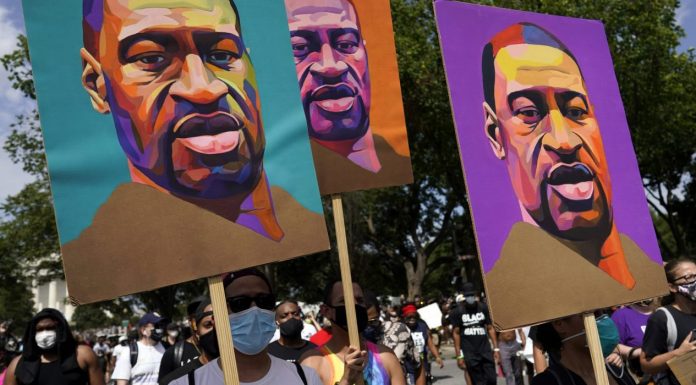(Associated Press) Law enforcement agencies across the country experienced a wave of retirements and departures and are struggling to recruit the next generation of police officers in the year since George Floyd’s death and slew of anti-police sentiment in recent years.
And amid the nationwide attacks on police, communities are questioning who should become a police officer today.
Mass protests and calls for reforming or defunding the police, as well as the coronavirus pandemic, took their toll on officer morale. The rate of retirements at some departments rose 45% compared with the previous year, according to new research on nearly 200 law enforcement agencies conducted by the Washington-based Police Executive Research Forum and provided to The Associated Press. At the same time, hiring slowed by 5%, the group found.
The wave comes as local lawmakers have pledged to enact reforms — such as ending the policies that give officers immunity for their actions while on-duty — and say they’re committed to reshaping policing in the 21st century. And recruiters are increasingly looking for a different kind of recruit to join embattled departments.
“Days of old, you wanted someone who actually had the strength to be more physical,” Atlanta Police Chief Rodney Bryant said. “Today’s police officers, that’s not what we’re looking for. We’re looking for someone who can actually relate to the community but also think like the community thinks.”
But the climate today, coupled with increases in crime in some cities, is creating what Chuck Wexler, the head of the Police Executive Research Forum, called a “combustible mixture.”
It’s creating “a crisis on the horizon for police chiefs when they look at the resources they need, especially during a period when we’re seeing an increase in murders and shootings,” Wexler said. “It’s a wake-up call.”
The data from Wexler’s organization represents a fraction of the more than 18,000 law enforcement agencies nationwide and is not representative of all departments. But it’s one of the few efforts to examine police hiring and retention and compare it with the time before Floyd’s killing in Minneapolis on May 25, 2020. Former officer Derek Chauvin, who pressed his knee on Floyd’s neck while Floyd was handcuffed behind his back, was convicted of murder and is awaiting sentencing.
Researchers heard from 194 police departments last month about their hires, resignations and retirements between April 1, 2020, and March 31, 2021, and the same categories from April 1, 2019, to March 31, 2020.
By comparison, the changing public attitude on policing is well documented. In the past year, as many as half of American adults believed police violence against the public is a “very” or “extremely” serious problem, according to one poll conducted by The Associated Press-NORC Center for Public Affairs Research.
“It’s hard to recruit the very people who see police as an opposition,” said Lynda R. Williams, president of the National Organization of Black Law Enforcement Executives, who previously worked on recruitment efforts for the Secret Service.
But it hasn’t shaken the resolve of some, like Kaley Garced, a hairdresser-turned-police officer in Baltimore who graduated from the academy last August. Despite the protests and attitudes toward law enforcement, she stayed with her career choice with a plan to interact with residents.
“Earning their trust” leads to better policing, she said. Citizens who trust officers will not be afraid to “call upon you on their worst day” and ask for help.
In Dallas, city leaders spent much of the last decade struggling to draw candidates and stem the outflow of officers frustrated by low pay and the near collapse of their pension fund.
Despite those efforts, the force now stands at about 3,100 officers — down from more than 3,300 in 2015 — a loss at a time when the city’s population has grown to more than 1.3 million. The force is about 44% white, 26% Black and 26% Latino. This means officers handle more calls and detectives more cases, all amid increased racial tension.
In 2016, five officers were killed in Dallas by a sniper who was seeking revenge for police shootings elsewhere that killed or wounded Black men. Two years later, an off-duty officer fatally shot her neighbor in his home. She was fired and later was sentenced to a decade in prison for murder.
Mike Mata, president of the Dallas Police Association, said the national political climate and local pay and pension issues have been compounding challenges to hiring in Dallas.
In 2019, however, a consulting firm Dallas hired to review its department found that it needed not simply more officers but also a “realignment of strategy, goals, mission, and tactics.” That finding rings true to Changa Higgins, a longtime community organizer.
“You don’t need to focus on hiring more officers,” Higgins said. “You need to focus on how you got these guys allocated.”
In Los Angeles, the department is fighting against a decade-long image of scandal and racial strife from the Watts riots in 1965 to the bloodshed in 1992 after a Simi Valley jury’s acquittal of officers who brutally beat motorist Rodney King.
Capt. Aaron McCraney, head of the Recruitment and Employment Division, and Chief Michel Moore ticked off the issues facing the 48 new recruits — more than half of whom were women — last year, noting that the pandemic, civil unrest and economic uncertainty were just some of the challenges the new officers would face.
“Even though these are tough times, these are difficult times, these are interesting times,” McCraney said, “these times will pass, and we’ll get on to things better.”

